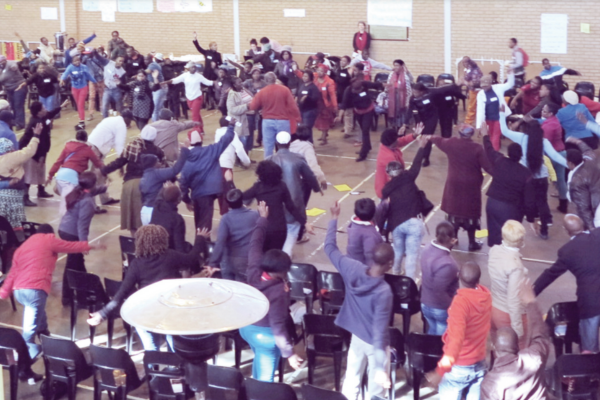Letsema open space in the Vaal, June 2014
Our work to eliminate Gender-Based Violence (GBV) in communities centres on Letsema, an intervention for changing entrenched social norms in the Vaal Triangle. Letsema integrates feminist leadership with principles of organisation and community development in a Gender Action Learning (GAL) programme. Letsema has greatly influenced gender attitudes and behaviours in the Vaal.
“It feels like God took his people and put them in the Vaal and forgot about them.”
Activist participant in Letsema intervention Tweet
This poignant statement captures the dire state of the Vaal Triangle in Gauteng Province. The Vaal suffers from high poverty, limited municipal services, environmental degradation, and persistent violence.
The Letsema intervention, initiated in late 2013, addresses the deep-seated social issues in the Vaal, particularly gender-based violence (GBV). The economic decline has left many residents jobless and impoverished, leading to various widespread concerns, including substance abuse, sexual violence, and gang involvement. Basic services are often inadequate, with frequent water disconnections and poor lighting exacerbating the struggles.
Through Letsema, Labour Research Service and Gender at Work supported a diverse coalition of local stakeholders – including trade unions, community organisations and forums, traditional healers, church groups, local media, universities, and government departments – to address GBV. Letsema integrates feminist leadership with principles of organisation and community development in a Gender Action Learning (GAL) programme.
Letsema is challenging social norms and empowering people to reduce gender-based violence. Participants use innovative learning tools and action-based strategies to create and implement their own solutions. This approach tackles immediate issues and inspires a broader movement in the Vaal. Activists are mentoring new communities to embrace gender equality.
The success of Letsema – with methodologies focused on inclusivity, collective impact, and community-driven solutions – offers valuable insights into addressing GBV in society. Our collaboration with unions and institutions such as the UK’s Manchester University aims to replicate the Letsema collective impact process, potentially reaching more communities in South Africa.
By posing the question: 'What will it take to achieve zero per cent GBV in the Vaal?', Letsema continues to inspire and mobilise the community towards lasting change.
The challenges for LGBTQ+ young people entering the world of work
Perspectives from LGBTQ+ youth in Letsema at an LRS webinar on negotiating inclusion in the world of work | 2022
Breakdowns in family relationships, feelings of rejection, and a general lack of support at home negatively impact the self-esteem and mental health of LGBTQ+ young people. This lack of support, coupled with discrimination, bullying, and violence in school and the community, puts LGBTQ+ youth at a significant disadvantage when seeking employment.
LGBTQ+ youth know what they need to feel safe at work. The young people in the video are between 18 and 26 years.
- The Story of Letsema
- Our hearts are joined: Writings from Letsema
- The covid-19 pandemic has highlighted the lopsided impact of the crisis on LGBT people in South Africa
- Using C190 to support the struggle against homophobic and transphobic violence in the world of work
- A practical guide for LGBTQ+ workers, their worker organisations and employers
Key project contact
Nina Benjamin | [email protected]







